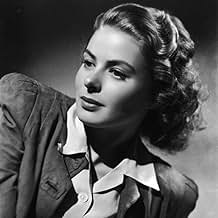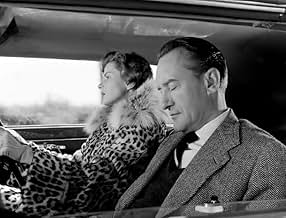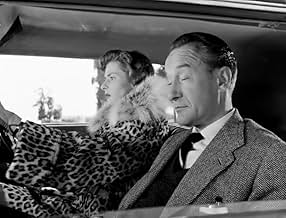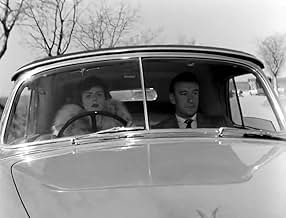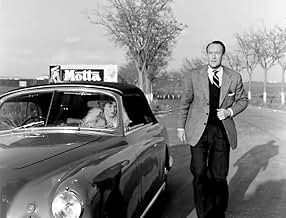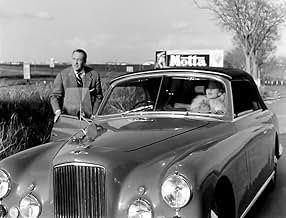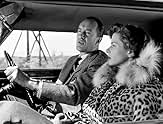VALUTAZIONE IMDb
7,3/10
13.322
LA TUA VALUTAZIONE
Una coppia infelicemente sposata cerca di trovare direzione e intuizione durante una vacanza a Napoli.Una coppia infelicemente sposata cerca di trovare direzione e intuizione durante una vacanza a Napoli.Una coppia infelicemente sposata cerca di trovare direzione e intuizione durante una vacanza a Napoli.
- Regia
- Sceneggiatura
- Star
- Premi
- 3 vittorie totali
George Sanders
- Alex Joyce
- (as Georges Sanders)
Maria Mauban
- Marie
- (as Marie Mauban)
Anthony La Penna
- Tony Burton
- (as Leslie Daniels)
Natalia Ray
- Natalie Burton
- (as Natalia Rai)
Bianca Maria Cerasoli
- Un'amica di Judy
- (non citato nei titoli originali)
Adriana Danieli
- Un'amica di Judy
- (non citato nei titoli originali)
María Martín
- Judy
- (non citato nei titoli originali)
Lyla Rocco
- La signora Sinibaldi
- (non citato nei titoli originali)
Recensioni in evidenza
This movie is being an example of some simplistic but beautiful and effective film-making. It doesn't follow a big story in which a big conflict suddenly arises or something needs to get solved or found but it's simply a movie about a, somewhat elderly British(?) couple, on holiday in Italy, who suddenly start to realize that they have never really loved each other.
It's a movie that works because of how well done and beautifully it all got done. It obviously helps that the movie is being set in Italy and features some of the famous landmarks, in and around Napels. The movie focus a lot on the culture and history, since the movie is seen through the eyes of our two main characters, that are tourists and new to the country. There is always something happening in the movie, even though it really doesn't follow a that complicated or thick storyline. It's a movie that prefers realism and is basically a random slice of life and about marriage, that of course is not always anything romantic or love filled. Suddenly they start to learn more about each other and about themselves, which makes them realize that they are perhaps not meant to be together. Doesn't sound that interesting perhaps but the way the story gets told simply makes this a great one to watch, that also never bores. Granted that it's also a quite short movie.
The movie also works well because the characters in it are being realistic and they interacting convincingly with each other. Both George Sanders and Ingrid Bergman gave some fine performances in this movie and were a convincing screen couple, who's marriage has worn out.
It's also a movie that benefits from the fact that it got done in black & white. For some reason I think this movie would had been way more cheesy had it been shot in full color. Instead now the movie has some real class and beauty to it as well.
Despite that it's a movie set in Italy and also an Italian produced movie, with an Italian title, it's still an mostly English spoken film. At least the two main characters speak Italian throughout. So those who normally won't come near a 'foreign' film can also easily watch this one, if you pick up the right, original, version of it of course.
Simply one fine little, well done, effective movie, by Italian director Roberto Rossellini.
8/10
http://bobafett1138.blogspot.com/
It's a movie that works because of how well done and beautifully it all got done. It obviously helps that the movie is being set in Italy and features some of the famous landmarks, in and around Napels. The movie focus a lot on the culture and history, since the movie is seen through the eyes of our two main characters, that are tourists and new to the country. There is always something happening in the movie, even though it really doesn't follow a that complicated or thick storyline. It's a movie that prefers realism and is basically a random slice of life and about marriage, that of course is not always anything romantic or love filled. Suddenly they start to learn more about each other and about themselves, which makes them realize that they are perhaps not meant to be together. Doesn't sound that interesting perhaps but the way the story gets told simply makes this a great one to watch, that also never bores. Granted that it's also a quite short movie.
The movie also works well because the characters in it are being realistic and they interacting convincingly with each other. Both George Sanders and Ingrid Bergman gave some fine performances in this movie and were a convincing screen couple, who's marriage has worn out.
It's also a movie that benefits from the fact that it got done in black & white. For some reason I think this movie would had been way more cheesy had it been shot in full color. Instead now the movie has some real class and beauty to it as well.
Despite that it's a movie set in Italy and also an Italian produced movie, with an Italian title, it's still an mostly English spoken film. At least the two main characters speak Italian throughout. So those who normally won't come near a 'foreign' film can also easily watch this one, if you pick up the right, original, version of it of course.
Simply one fine little, well done, effective movie, by Italian director Roberto Rossellini.
8/10
http://bobafett1138.blogspot.com/
This is the film that Truffaut writing for Cahiers proclaimed 'the first modern film', going on to praise Rossellini as the father of New Wave. If we don't want to be stridently literal about these things, I agree with him. A bunch of filmmakers who changed the face of cinema in the 60's are all connected to Rossellini and flow out from this film.
At the heart of it we have the familiar trope of a marriage falling apart, melodrama stuff. But modern, meaning understated and without the soaring emotion. We fill the gaps, providing our own understanding of how a relationship works. We participate as players.
So it's about this affair whose nothingness is revealed by the surrounding world, it withers away; the lavish villa with endless views of far horizon, the large, empty veranda where the two of them languish in comfortable lounge chairs. A little outside, it's the countryside of Naples that engulfs them with languid time and hot, lazy weather, a tabula rasa dotted with old ruins.
We're taken on a pilgrimage of these ruins, as the woman looking for a portent that will divine her predicament. The museum filled with statues, the old Roman fort, Vesuvius and Pompeii; Rossellini presents them as mute, ascetic images, images all pertaining to some austere representation into which the woman projects her own world coming to pass. None of them, of course, hold any answers, except as what they are - reminders of the perishable, impermanent world in which we try so hard to grow roots.
Meanwhile, back in Capri, the cynical husband is squandered in his own aimless voyage for something that will fill the time. He courts a woman, much like he did his wife perhaps all those years ago. He feigns and thrusts for desire. Finally he returns home with the same void gnawing inside. Passable stuff, as in La Notte some years later, but the important stuff is with the woman's journey; the Stromboli part of the film as it were.
It is all about the painful process by which ruins are made, time into memory. We are privy to one such enactment in ancient Pompeii (then still being excavated): into the hole once occupied by a dead body, that holds nothing now and is hollow except with shape, the archaeologists pour plaster in order to surmise the shape of that past. Yet what they retrieve is merely the replica of empty space.
Oh, there's the stupidly saccharine finale, no doubt imposed once again on Rossellini by his Italian distributors at Titanus. It's something to be on the lookout for, for how marvelously Rosssellini confounds his censors.
As the couple magically decide they finally love each other, the mob of peasants that surrounds them - participating in some local religious ceremony - cries out in jubilee about 'il miracolo!'. The two lovers are swept aside by people rushing to see, reunited in this nonsensical miracle. The final shot is of police offers looking stern as they inspect the scene, like the censors would the film. Whether or not we choose to accept the one miracle, boils down to whether or not we would the other.
I want to summarize Rossellini here; he's largely forgotten now - probably because when the cinema he envisioned finally took hold, he had already abandoned it. But he's one of the most important filmmakers we have known. You find out that so much of what eventually blossomed with film, grew first roots with him. His transcendent vision was exceptional.
The only misgiving - slight, very slight - is that everything is relatively precise with meaning. Empty space abounds here, the pure ascetic images, yet is mostly filled for us. We're left with simply unearthing the cast, reading the signs. Perhaps I'm saying this because he envisioned so far ahead that I'm comparing him in my mind with later filmmakers who abstracted deeper. No matter, Rossellini ushered cinema far enough.
Now it would be Antonioni's turn to shoulder it; he would supply the breathing, incomplete space into which the imagination can pour into. There is no cast that explains away with him, only the means of immersion into a space empty, waiting-to-be-filled with us (not by us). The ensuing voyage that finally brings us to The Passenger is one of the most fascinating that I know of, but that is covered elsewhere.
At the heart of it we have the familiar trope of a marriage falling apart, melodrama stuff. But modern, meaning understated and without the soaring emotion. We fill the gaps, providing our own understanding of how a relationship works. We participate as players.
So it's about this affair whose nothingness is revealed by the surrounding world, it withers away; the lavish villa with endless views of far horizon, the large, empty veranda where the two of them languish in comfortable lounge chairs. A little outside, it's the countryside of Naples that engulfs them with languid time and hot, lazy weather, a tabula rasa dotted with old ruins.
We're taken on a pilgrimage of these ruins, as the woman looking for a portent that will divine her predicament. The museum filled with statues, the old Roman fort, Vesuvius and Pompeii; Rossellini presents them as mute, ascetic images, images all pertaining to some austere representation into which the woman projects her own world coming to pass. None of them, of course, hold any answers, except as what they are - reminders of the perishable, impermanent world in which we try so hard to grow roots.
Meanwhile, back in Capri, the cynical husband is squandered in his own aimless voyage for something that will fill the time. He courts a woman, much like he did his wife perhaps all those years ago. He feigns and thrusts for desire. Finally he returns home with the same void gnawing inside. Passable stuff, as in La Notte some years later, but the important stuff is with the woman's journey; the Stromboli part of the film as it were.
It is all about the painful process by which ruins are made, time into memory. We are privy to one such enactment in ancient Pompeii (then still being excavated): into the hole once occupied by a dead body, that holds nothing now and is hollow except with shape, the archaeologists pour plaster in order to surmise the shape of that past. Yet what they retrieve is merely the replica of empty space.
Oh, there's the stupidly saccharine finale, no doubt imposed once again on Rossellini by his Italian distributors at Titanus. It's something to be on the lookout for, for how marvelously Rosssellini confounds his censors.
As the couple magically decide they finally love each other, the mob of peasants that surrounds them - participating in some local religious ceremony - cries out in jubilee about 'il miracolo!'. The two lovers are swept aside by people rushing to see, reunited in this nonsensical miracle. The final shot is of police offers looking stern as they inspect the scene, like the censors would the film. Whether or not we choose to accept the one miracle, boils down to whether or not we would the other.
I want to summarize Rossellini here; he's largely forgotten now - probably because when the cinema he envisioned finally took hold, he had already abandoned it. But he's one of the most important filmmakers we have known. You find out that so much of what eventually blossomed with film, grew first roots with him. His transcendent vision was exceptional.
The only misgiving - slight, very slight - is that everything is relatively precise with meaning. Empty space abounds here, the pure ascetic images, yet is mostly filled for us. We're left with simply unearthing the cast, reading the signs. Perhaps I'm saying this because he envisioned so far ahead that I'm comparing him in my mind with later filmmakers who abstracted deeper. No matter, Rossellini ushered cinema far enough.
Now it would be Antonioni's turn to shoulder it; he would supply the breathing, incomplete space into which the imagination can pour into. There is no cast that explains away with him, only the means of immersion into a space empty, waiting-to-be-filled with us (not by us). The ensuing voyage that finally brings us to The Passenger is one of the most fascinating that I know of, but that is covered elsewhere.
"Viaggio in Italia" is a unique experience, a beautiful work of art, and perhaps Rossellini's masterpiece, though I equally cherish GERMANY YEAR ZERO and FLOWERS OF ST. FRANCIS. It can best be viewed on the big screen in order to fully grasp its mysterious beauties. But, alas, it is not for every taste. The film was a commercial disaster when it opened. But those perceptive "Cahiers du Cinema" critics - Godard, Rivette, Rohmer, Truffaut - justly hailed it as a modern masterpiece and placed in their list of ten best films of all time. Ingrid Bergman and George Sanders are nothing short of brilliant as the feuding British couple who travel to Naples to close their holiday home. Rossellini's breathtaking documentary scenes in the Mediterranean background are perfectly melded with the fictional story of the couple and their state of mind. It all comes down to that final miraculous moment that no written words can describe. Subtle, mysterious and beautiful, "Viaggio" ranks with the finest works in cinema.
At the Cahiers Du Cinéma, Francois Truffaut, a great representative of the New Wave in France, proclaimed Roberto Rossellini's production "the first modern film." What he meant by "modern" at that time is, perhaps, of little relevance nowadays: the film is black and white; the film's producers and cast represent the classic symbols of the past period. Moreover, it seems that we can afford more spectacular journeys to Italy than the one introduced here. The miraculous Sorrento Coast has been photographed and filmed in many far more impressive technologies. Nevertheless, Truffaut's viewpoint occurs to be relevant to many modern fans of this old yet 'modern' film.
To understand that, we have to underline something significant in that respect: although VIAGGIO IN ITALIA does not belong to the Neorealist films of the time, it appears to inspire and manifest the seemingly best period for Italian cinema that Neorealist movement was. The film art meant to address simple people with what they really experience in life. Therefore, the theme that is being developed in VIAGGIO IN ITALIA is so down to earth. We can still feel similar empathy with the characters that the 1954 viewers felt. Empathy with whom?
Two people appear to be in the lead, a married couple played by great cinema stars of the time: Ingrid Bergman (Rossellini's wife) and George Sanders. Although Ingrid Bergman was cast by Roberto Rossellini in more of his "Italian series" (e.g. STROMBOLI LA TERRA DI DIO), she is exceptional here. We get to see the couple in media res on their road (mind you the deliberate image of the road at the beginning) and gradually get to know them authentically through what they say and through what they do. Catherine (Ms Bergman) and Alex (Mr Sanders) experience the crisis of their marriage...although they are a couple, two people who should naturally love each other, they are as if strangers and feel like ones; although they are meant to be similar, they differ considerably. And there is one little step towards making this film an anti-marriage conclusion. Yet, Rossellini chooses something more demanding by listening to Italy's stones of history which seem to speak to us now. A woman and a man...having the same destination, will their ways face bitter separation?
Ingrid Bergman convincingly portrays a woman of sophisticated tastes, of intellect and feelings. Her character is the one to be liked and empathized with, particularly at the scene when she talks of her former love, a poet Charles. He is dead...yet, he seems to be alive in her, she follows his traces, she experiences the haunting whispers of the past. It is memorably executed in the overwhelming scene when she visits the museum of Naples. What a shot! We see Ingrid, a great beauty, walking among the grandiose sculptures, among the men of 2,000 years ago, people of the past who appear to be so much like the people of today. I think that this conclusion of hers which she shares with Alex is, as if, the quintessential message of the film. Although times change, people's desires and certain values are universal and timeless. We can say that Catherine is constantly haunted by her own past and by the past strictly linked to the places she visits...the echo of voices, the coldness of the catacombs, the might and power of the volcanoes, the chaos of the streets of Naples and the excavations at Pompeii. She dreams of a good life, an independent life, easy going life (the maxim 'how sweet it is to do nothing' makes some sense, at least an amusing sense for her); yet, the moments she sees mothers with babies in the streets fill her with unique nostalgia.
Alex is different....he does not find Italy very charming because of his practical, cold, unemotional view on life. He is a hypocrite-like master who has never seen 'noise and boredom go so well together.' He is bored and boring himself. He leaves because he has nothing to do...he has nothing to say and the stories about a dreamer, a poet make him both jealous and sarcastic. Yet, the experience with a chick he dates in idyllic Capri opens his eyes a bit and he changes within. He is strict and hilarious, particularly at the moment he searches for a glass of mineral water.... Work and duty that mean so much for him not necessarily mean much to Catherine...yet, does it mean that they have to be apart? His dominant role of a man is excellently directed towards the background and his egocentric desires are well crafted and manipulated both in the performance and the direction. Rossellini highlights Catherine more as the woman who goes through inner trouble but enlightens a lot within her inner self and in others. I wish the ending were more developed and not so condensed in the climactic idea of the movie...But the camera-work in the finale really escapes from the Hollywood cliché and it does deliberately and successfully so.
What does VIAGGIO IN ITALIA offer us? Good sense of humor with a bit of sentimentality, lovely views of Italian miracles, great performances of two celebrities among simple people, and the combination of the past and the present. It would be a lovely discovery to say that this film may be liked both by Americans and Europeans....because it is no chronology, no storyline, just a terrific combination of the past that haunts us and educates us, the present that follows us and influences us and the future that is the mother of the two and the mother of none alike. An old film with an ever 'modern' content.
The first shot of the film is the very first impression that highlights their way(s) which appear(s) to lead us to a certain moment...the final shot of the film is the last conclusion that focuses on people walking the paths of history with their own desires, with their own decisions.
To understand that, we have to underline something significant in that respect: although VIAGGIO IN ITALIA does not belong to the Neorealist films of the time, it appears to inspire and manifest the seemingly best period for Italian cinema that Neorealist movement was. The film art meant to address simple people with what they really experience in life. Therefore, the theme that is being developed in VIAGGIO IN ITALIA is so down to earth. We can still feel similar empathy with the characters that the 1954 viewers felt. Empathy with whom?
Two people appear to be in the lead, a married couple played by great cinema stars of the time: Ingrid Bergman (Rossellini's wife) and George Sanders. Although Ingrid Bergman was cast by Roberto Rossellini in more of his "Italian series" (e.g. STROMBOLI LA TERRA DI DIO), she is exceptional here. We get to see the couple in media res on their road (mind you the deliberate image of the road at the beginning) and gradually get to know them authentically through what they say and through what they do. Catherine (Ms Bergman) and Alex (Mr Sanders) experience the crisis of their marriage...although they are a couple, two people who should naturally love each other, they are as if strangers and feel like ones; although they are meant to be similar, they differ considerably. And there is one little step towards making this film an anti-marriage conclusion. Yet, Rossellini chooses something more demanding by listening to Italy's stones of history which seem to speak to us now. A woman and a man...having the same destination, will their ways face bitter separation?
Ingrid Bergman convincingly portrays a woman of sophisticated tastes, of intellect and feelings. Her character is the one to be liked and empathized with, particularly at the scene when she talks of her former love, a poet Charles. He is dead...yet, he seems to be alive in her, she follows his traces, she experiences the haunting whispers of the past. It is memorably executed in the overwhelming scene when she visits the museum of Naples. What a shot! We see Ingrid, a great beauty, walking among the grandiose sculptures, among the men of 2,000 years ago, people of the past who appear to be so much like the people of today. I think that this conclusion of hers which she shares with Alex is, as if, the quintessential message of the film. Although times change, people's desires and certain values are universal and timeless. We can say that Catherine is constantly haunted by her own past and by the past strictly linked to the places she visits...the echo of voices, the coldness of the catacombs, the might and power of the volcanoes, the chaos of the streets of Naples and the excavations at Pompeii. She dreams of a good life, an independent life, easy going life (the maxim 'how sweet it is to do nothing' makes some sense, at least an amusing sense for her); yet, the moments she sees mothers with babies in the streets fill her with unique nostalgia.
Alex is different....he does not find Italy very charming because of his practical, cold, unemotional view on life. He is a hypocrite-like master who has never seen 'noise and boredom go so well together.' He is bored and boring himself. He leaves because he has nothing to do...he has nothing to say and the stories about a dreamer, a poet make him both jealous and sarcastic. Yet, the experience with a chick he dates in idyllic Capri opens his eyes a bit and he changes within. He is strict and hilarious, particularly at the moment he searches for a glass of mineral water.... Work and duty that mean so much for him not necessarily mean much to Catherine...yet, does it mean that they have to be apart? His dominant role of a man is excellently directed towards the background and his egocentric desires are well crafted and manipulated both in the performance and the direction. Rossellini highlights Catherine more as the woman who goes through inner trouble but enlightens a lot within her inner self and in others. I wish the ending were more developed and not so condensed in the climactic idea of the movie...But the camera-work in the finale really escapes from the Hollywood cliché and it does deliberately and successfully so.
What does VIAGGIO IN ITALIA offer us? Good sense of humor with a bit of sentimentality, lovely views of Italian miracles, great performances of two celebrities among simple people, and the combination of the past and the present. It would be a lovely discovery to say that this film may be liked both by Americans and Europeans....because it is no chronology, no storyline, just a terrific combination of the past that haunts us and educates us, the present that follows us and influences us and the future that is the mother of the two and the mother of none alike. An old film with an ever 'modern' content.
The first shot of the film is the very first impression that highlights their way(s) which appear(s) to lead us to a certain moment...the final shot of the film is the last conclusion that focuses on people walking the paths of history with their own desires, with their own decisions.
Katherine (Ingrid Bergman) and Alex Joyce (George Sanders) are on vacation in Italy. It's been eight years of marriage and they feel like strangers to each other.
This is scenes from a marriage and a road trip to personal discovery. It's meandering but that's perfectly fine. It's meant to be. Director Roberto Rossellini inadvertently starts a new movement in looser story telling in films. It's jazz when music has been all classical. The only ill-fitting aspect is the glamor of Ingrid Bergman. It's not a big thing or even a bad thing. She cannot be less than the movie superstar beauty that she is. It takes me out of the movie sometimes although there is an autobiographical suggestion within these characters. It takes away from their everyday struggles within their relationship. I do wonder if an average looking couple would make this an even more compelling examination into a marriage. I also wonder if the couple should stay together throughout the movie so that they can fill out their relationship more. I want them to talk this out together from start to finish.
This is scenes from a marriage and a road trip to personal discovery. It's meandering but that's perfectly fine. It's meant to be. Director Roberto Rossellini inadvertently starts a new movement in looser story telling in films. It's jazz when music has been all classical. The only ill-fitting aspect is the glamor of Ingrid Bergman. It's not a big thing or even a bad thing. She cannot be less than the movie superstar beauty that she is. It takes me out of the movie sometimes although there is an autobiographical suggestion within these characters. It takes away from their everyday struggles within their relationship. I do wonder if an average looking couple would make this an even more compelling examination into a marriage. I also wonder if the couple should stay together throughout the movie so that they can fill out their relationship more. I want them to talk this out together from start to finish.
Lo sapevi?
- QuizGeorge Sanders, in his 1960 autobiography, wrote at length about the making of this film, which he found an exasperating and unpleasant experience. He spoke witheringly about Roberto Rossellini, whom he characterized as being more interested in scuba diving than in film-making. Although the tone of his remarks is one of amusement, it became known that Sanders (who had admired earlier Rossellini films) had been deeply affected by exposure to a style of film-making quite foreign to his previous experience, and had spent the shoot feeling frustrated and angry, often bursting into uncontrollable tears.
- BlooperAfter deciding to leave Pompeii and walking down the stairs for the exit, the arm and shoulder of a crew member appear in the lower right side of the screen.
- Citazioni
Alex Joyce: What noisy people! I've never seen noise and boredom go so well together.
Katherine Joyce: Oh I don't know, Uncle Homer lived here for 40 years without getting bored.
Alex Joyce: Uncle Homer was not a normal person.
- ConnessioniEdited into Histoire(s) du cinéma: Fatale beauté (1994)
I più visti
Accedi per valutare e creare un elenco di titoli salvati per ottenere consigli personalizzati
- How long is Journey to Italy?Powered by Alexa
Dettagli
Botteghino
- Lordo in tutto il mondo
- 20.072 USD
- Tempo di esecuzione
- 1h 25min(85 min)
- Colore
- Mix di suoni
- Proporzioni
- 1.37 : 1
Contribuisci a questa pagina
Suggerisci una modifica o aggiungi i contenuti mancanti


